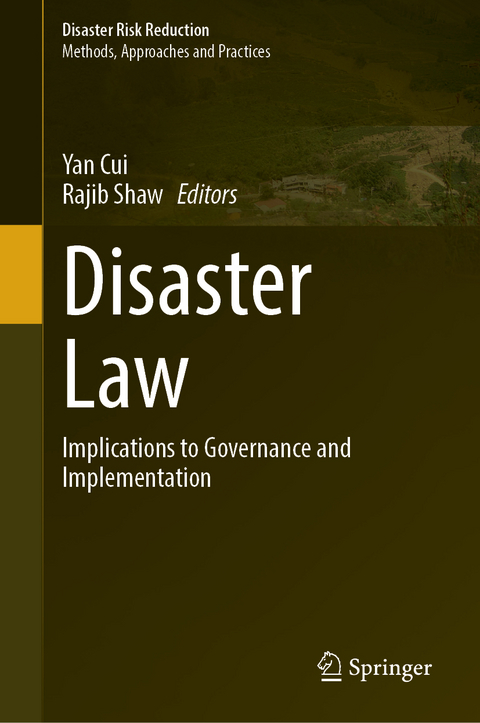
Disaster Law
Springer Nature (Verlag)
978-981-97-7373-2 (ISBN)
- Titel nicht im Sortiment
- Artikel merken
Disaster law is the core to disaster risk management.
This book covers the broad aspects of disaster legislation, governance, and their implementation. The book also includes in-depth reviews and new data, based on case studies across the globe, involving multidisciplinary research. In addition, the book suggests specific policies and action measures to enhance the implementation of disaster legislation for the resilience of people and local governments.
Disaster law is the core to disaster risk management. The legal framework not only provides the government an instrument to take actions before, during, and after a disaster, but it also helps in recovery process. The legislative measures provide certain levels of guidance to different stakeholders such as national governments, local governments, civil societies, and more importantly citizens. The legal provision gives people and communities certain obligations as well as responsibilities to act during or before disasters. Over the last several years, there has been new disaster laws formulated in many countries, and revisions have been made to adjust the existing disaster laws to be more effective. Although it is important to have governance provision of disaster law, its implementation is essential.
Yan Cui is an associate professor in the School of Law at the Gansu University of Political Science and Law in China. She is also a young scientist involved in Integrated Research on Disaster Risk (IRDR) research program. Additionally, she is a member of the Legal Talent Pool for the Gansu Provincial Government and an adjunct researcher at the Civil-Military Integration Law Research Institute, China University of Political Science and Law. Her expertise lies in international disaster law and international humanitarian law. She has collaborated with the International Federation of Red Cross and Red Crescent Societies (IFRC) on research related to international disaster response law and disaster risk reduction law in China. She has also served as the principal investigator of 2 projects funded by the National Social Science Foundation in China. Since 2018, she has been actively involved as a coach and judge in various international law moot competitions in China, including the PhilipC. Jessup International Law Moot Competition, Red Cross International Humanitarian Law Moot, and International Criminal Court (ICC) Moot Competition. These competitions provide law students with a platform to learn current global international law issues and address them at their core. Rajib Shaw is a professor in the Graduate School of Media and Governance in Keio University, Japan. He is also a senior fellow of the Institute of Global Environmental Strategies (IGES) Japan and the chairperson of the Sustainable Environment and Ecological Development Society (SEEDS) Asia and the Church World Service (CWS) Japan, two Japanese NGOs. He is a co-founder of a Delhi (India)-based social entrepreneur startup, the Resilience Innovation Knowledge Academy (RIKA). Earlier, he was the executive director of the Integrated Research on Disaster Risk (IRDR) and was a professor in Kyoto University. His expertise includes disaster governance, community-based disaster risk management, climate change adaptation, urban risk management, and disaster and environmental education. Professor Shaw was the chair of the United Nations Science Technology Advisory Group (STAG) for disaster risk reduction and currently is the co-chair of the Asia Pacific Science Technology Academic Advisory Group (APSTAAG). He is also the coordinating lead author (CLA) for the Asia chapter’s 6th Assessment Report of the Intergovernmental Panel on Climate Change (IPCC). He is the editor-in-chief of the journal Progress in Disaster Science and series editor of a Springer book series on disaster risk reduction. Prof. Shaw has published 66 books and over 450 academic papers and book chapters.
Overview of Disaster and humanitarian legislation.- Key issues and challenges of disaster law in Japan.- Overview of disaster legislation in USA.- Disaster law in China.- Disaster law in Indonesia.- Disaster legislation in the Philippines.- Disaster Law in Bangladesh.- Disaster Management law in India.- Disaster Management law in Nepal.- Disaster Management law in Pakistan.- Disaster Management law in Turkey.- Disaster management law in European Union.
| Erscheint lt. Verlag | 11.1.2025 |
|---|---|
| Reihe/Serie | Disaster Risk Reduction |
| Zusatzinfo | 43 Illustrations, color; 10 Illustrations, black and white; XX, 180 p. |
| Sprache | englisch |
| Maße | 155 x 235 mm |
| Themenwelt | Naturwissenschaften ► Biologie ► Ökologie / Naturschutz |
| Naturwissenschaften ► Geowissenschaften | |
| Recht / Steuern ► EU / Internationales Recht | |
| Recht / Steuern ► Öffentliches Recht | |
| Schlagworte | Community Governance • Disaster Law • disaster risk reduction • governance framework • Implementation mechanism • Stakeholder Participation |
| ISBN-10 | 981-97-7373-3 / 9819773733 |
| ISBN-13 | 978-981-97-7373-2 / 9789819773732 |
| Zustand | Neuware |
| Haben Sie eine Frage zum Produkt? |
aus dem Bereich


